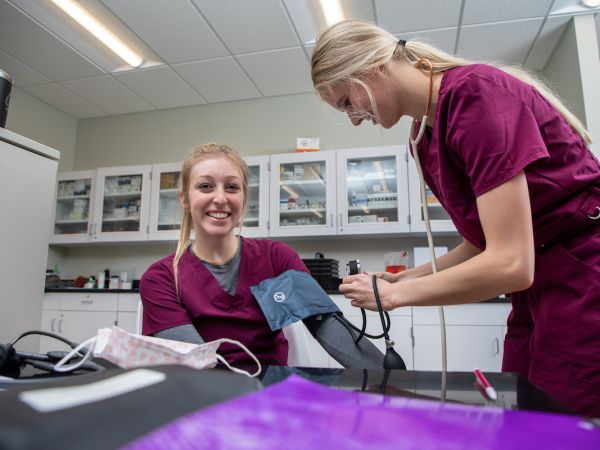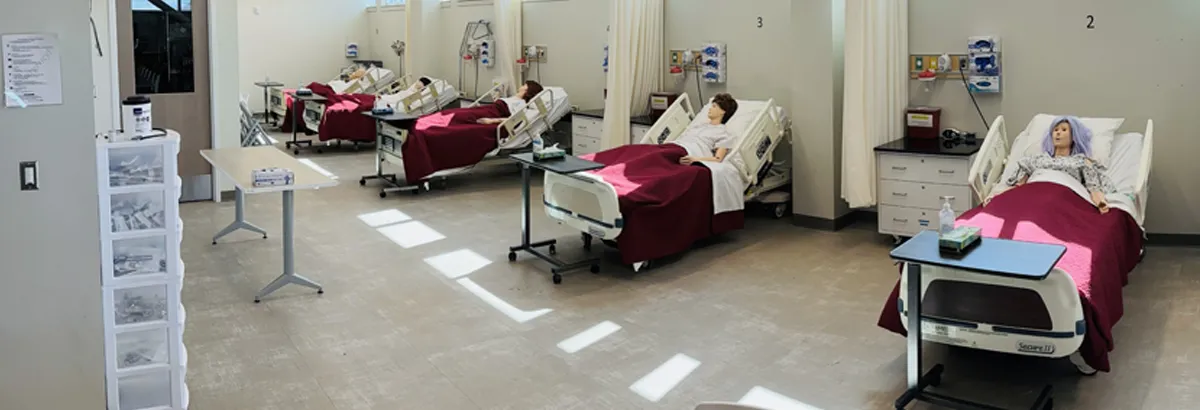
Medical Assistant Pathways
Our programs are designed to prepare the student for an entry-level position in Medical Assisting. Students in Medical Assisting are cross-trained with skills and knowledge in front office administrative, clinical, and limited laboratory procedures that are designed to assist healthcare practitioners in administering to the needs of patients.
Missoula College offers two MA pathways: Clinical Medical Assisting, Certificate of Technical Studies (2 semesters), and Medical Assisting, Associate of Applied Science (4-5 semesters). Both paths lead to certifications required by facilities.
Medical Assisting – at the Heart of Healthcare!
Medical Assistants (MAs) work alongside licensed healthcare providers, primarily in outpatient or ambulatory care facilities, such as medical offices and clinics, performing administrative and/or clinical duties.
Medical Assisting careers are growing at a faster than average rate for all occupations according to the United States Bureau of Labor Statistics. This job growth is attributed to the following factors:
- Predicted surge in the number of healthcare provider offices and outpatient care facilities
- Technological advancements
- Growing number of elderly Americans who require medical treatment
MAs are cross-trained to perform a broad spectrum of administrative and clinical duties.
What to Expect
Medical Assisting can be a good springboard job into other careers. After completing the Medical Assisting Program, an MA will qualify to work alongside licensed healthcare providers in medical offices and clinics, at a health insurance company, a home care agency, as a phlebotomist, or an ECG technician. With some additional schooling or experience, an MA could work as a laboratory assistant, a limited radiologic technician, or even a Medical Assisting instructor!
-

Administrative Duties
- Using computer applications, including an electronic medical record (EMR)
- Scheduling patient appointments
- Greeting patients in-person and/or over the phone
- Maintaining a clean, safe, and pleasant environment
- Updating patient medical records
- Diagnostic and procedural coding of patient visits
- Completing and submitting insurance claims to third party payers
- Arranging for hospital admissions and laboratory services
- Handling correspondence, accounts receivable, accounts payable, and general bookkeeping tasks
-

Clinical Duties
- Obtaining patient medical histories
- Explaining treatment procedures to patients
- Preparing patients for examination, including transferring patients from a wheelchair to an exam room table and vice versa
- Assisting the provider during physical exams
- Collecting and preparing laboratory specimens
- Performing basic laboratory tests
- Instructing patients about medication and special diets
- Preparing and administering medications as directed by a licensed healthcare provider
- Authorizing prescription refills as directed by a licensed healthcare provider
- Drawing blood (venipuncture)
- Performing electrocardiogram (EKG)
- Removing sutures and changing dressings
-

Patient Liaison
Medical Assistants are instrumental in helping patients feel at ease in the medical office, and often explain the healthcare provider’s instructions to the patient and family or caregivers. -

PCMH Team Member
Medical Assistants are essential members of the Patient-Centered Medical Home (PCMH) team. According to a survey by the Healthcare Intelligence Network, MAs rank as one of the top five professionals necessary to the PCMH team.

Administrative Duties
- Using computer applications, including an electronic medical record (EMR)
- Scheduling patient appointments
- Greeting patients in-person and/or over the phone
- Maintaining a clean, safe, and pleasant environment
- Updating patient medical records
- Diagnostic and procedural coding of patient visits
- Completing and submitting insurance claims to third party payers
- Arranging for hospital admissions and laboratory services
- Handling correspondence, accounts receivable, accounts payable, and general bookkeeping tasks

Clinical Duties
- Obtaining patient medical histories
- Explaining treatment procedures to patients
- Preparing patients for examination, including transferring patients from a wheelchair to an exam room table and vice versa
- Assisting the provider during physical exams
- Collecting and preparing laboratory specimens
- Performing basic laboratory tests
- Instructing patients about medication and special diets
- Preparing and administering medications as directed by a licensed healthcare provider
- Authorizing prescription refills as directed by a licensed healthcare provider
- Drawing blood (venipuncture)
- Performing electrocardiogram (EKG)
- Removing sutures and changing dressings

Patient Liaison

PCMH Team Member
Medical Assistants are essential members of the Patient-Centered Medical Home (PCMH) team. According to a survey by the Healthcare Intelligence Network, MAs rank as one of the top five professionals necessary to the PCMH team.
Entrance and Program Requirements
Grade Requirements: Students must earn a ‘C’ or higher in the Medical Assisting core courses. MA core courses may not be attempted more than twice. Students must pass the core course with a ‘C’ or higher on the second attempt in order to continue in the MA Program.
Physical Requirements: Students must be able to alternately stand and sit for long periods of time (up to 10 hours per day), lift up to 50 pounds regularly, possess excellent vision (with or without correction), possess excellent hearing (with or without correction), and possess excellent manual dexterity. Students are encouraged to maintain overall good health through healthy lifestyle choices to ensure they can safely and competently perform the various duties within the Medical Assistant Scope of Practice.
Lab Requirement: Prior to beginning AHMA 201 Clinical Procedures 1, students will complete a variety of requirements to ensure student safety during courses and the administrative/clinical externship experience. These requirements include up-to-date immunization status (Tdap, varicella, hepatitis B, MMR), PPD testing, a clear background check, and CPR/AED certification.
Externship: The Medical Assisting Externship is the capstone course of the MA Program and is completed during the student’s final semester in the program. It is a 200-hour administrative (front office) and clinical (back office) experience which provides the MA student the opportunity to apply their medical assisting skills in a fully functioning medical office. The Medical Assisting program director coordinates the externship experience for all MA program students.
Degree-specific Requirements
The ŔĎ»˘»úąĄÂÔ catalog details degree specific credits and course requirements.
|
Subject |
|---|
Contact US
Michelle Boller, Program Director
Email: Michelle.Boller@umontana.edu
Phone: 406-243-7877
Office: MC 409
